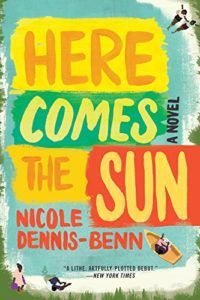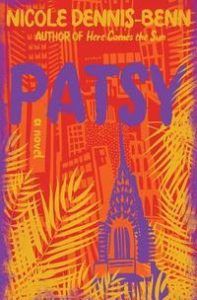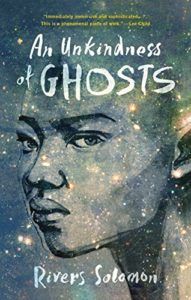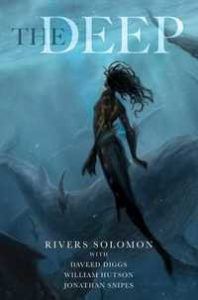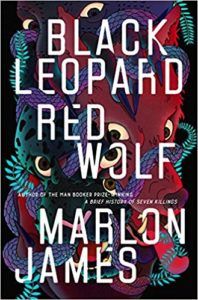All readers know that one of the best ways to find new books—perhaps the most time-honored and reliable way—is to read books by authors you love. If you love one book by a certain author, chances are high that you’ll love the rest of them. Of course, this also goes the other way: if you didn’t enjoy one book by an author, it’s quite likely you won’t enjoy the others. Maybe that author’s style just isn’t for you. In a world that already has way more incredible books that any of us will ever be able to read in a lifetime, determining which authors you love and which are not your cup of tea is definitely useful. Until you realize that “you won’t like their second novel if you didn’t love their first one ” is most certainly not a hard and fast rule. I read Here Comes the Sun by Nicole Dennis-Benn when it came out in 2016. I didn’t love it. I didn’t hate it. On the whole, enjoyed it. It’s not a book I regret reading. I could easily understand its importance and I was glad to see it get the attention it deserved. But it was not a book that stayed with me. I can’t remember much about it now. So when Dennis-Benn’s next book, Patsy, came out in 2019, I didn’t rush to pick it up. My TBR is already long enough; reading Patsy was not a priority for me. But it kept popping up on my radar. My aunt raved about the audiobook. Goodreads friends with similar taste in books to me gave it stellar reviews. So, in February I finally read it. Friends, I do not give books five stars very often. In a year of reading 150 books or so, I might give four of them five stars. Patsy was a five star read for me. It utterly blew me away. It got under my skin and lodged itself in my heart. I listened to the audiobook (which was just as amazing as my aunt said) and was so deeply immersed in the story that I had to stop washing the dishes and just listen to the last hour of it. Patsy, in my opinion, is a near-perfect novel. It has stunning, complex characterization, the kind of messy, truthful queer representation I crave, and a lot to say about motherhood, womanhood, and immigration. I find myself thinking about it all the time now. I recommend it constantly. I had a similar experience with Rivers Solomon. I read their debut, An Unkindness of Ghosts, with a lot of mixed feelings. I loved the world building and the characters. But the novel just didn’t come together for me. Something about the meandering plot didn’t grab me. I read it a little over a year ago, and I have trouble remembering anything about it. So I didn’t jump on their second novel, The Deep, when it came out in 2019. But then I was looking around for a short audiobook, saw that The Deep was only four hours long, read the premise and thought, why not? I listened to that book in one afternoon and couldn’t immediately start another audiobook because I didn’t want to be inevitably disappointed that whatever I read next would not be as good. The Deep is a novella based on a song by the group clipping. in which pregnant woman thrown overboard from slave ships give rise to a race of underwater people. It is beautiful and haunting and brilliant. I can’t think offhand of another novella I love more. It can be hard to sink into a novella the way you sink into a novel, but Solomon’s characters are so compelling, their world building so intricate, their prose so beautiful, that I was completely transported. I rave about this book every chance I get. Sometimes, of course, I encounter less delightful surprises. Black Leopard, Red Wolf by Marlon James was one of my favorite reads of 2019. I loved it so much that immediately after I finished it I read A Brief History of Seven Killings, a book that had been languishing on my TBR forever. I didn’t dislike it, but I didn’t love it. It certainly didn’t astonish me the way Black Leopard, Red Wolf did. I’m still planning to read the rest of Marlon James’s work, but with different expectations: I know I might not love every single one of his novels the way I love Black Leopard, Red Wolf. Overall, I think it is possible to get a sense of an author and how you’re likely to react to their work. I sill have my beloved must-read authors, writers whose work I love unequivocally. But there are plenty of authors where it’s more of a mixed bag: I love some of their books, like some of their others, and actively dislike a few. I still don’t always jump on second novels if I wasn’t wild about the first one. But falling in love with books by authors whose debuts I didn’t especially like has reminded me how vast and varied the human imagination is. Authors are not monoliths. They write many different kinds of stories. As readers, we react differently to books depending on when and where and how we encounter them. I find it comforting—and a little thrilling—that I can have such varied reactions to work by the same writer. It’s freeing. It’s a testament to all the ways that both writers and readers change over time. I definitely don’t hesitate to toss a book on the DNF pile if I’m not connecting with it. But I’ll never again refuse to give a book a chance just because I didn’t fall head-over-heels for a different book that author wrote.
